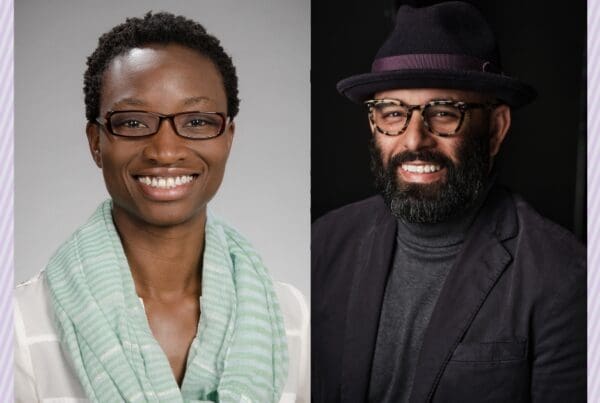Highlights | Building Q-mmunity
- Queer Medical Student Affinity Group, or QMED, helps queer medical students connect with each other and with queer and ally mentors.
- It also gives them opportunities to be advocates for gender-affirming and other LGBTQ+ healthcare in their local communities.
- In a time when anti-LGBTQ+ legislation is increasing, it’s more important than ever for queer, transgender and gender non-conforming students to feel seen and supported.
Community and mentorship are crucial for medical students to help them feel supported and build their careers — even more so for students whose identities are often marginalized or underrepresented. For LGBTQ+ students, this is where a student organization called Queer Medical Student Affinity Group, aka QMED, comes in.
Hosted by the Office of Student Affairs in the UW School of Medicine, QMED connects LGBTQ+ students with each other and with LGBTQ+ trainees, faculty and staff, along with allies, to build community and empower students in their identities. Its mission is also to create a safe academic environment for queer students at the UW School of Medicine and to provide education and information about healthcare issues affecting the gay, lesbian, bisexual, transgender, non-binary, intersex, asexual, two-spirit and broader queer communities.
“Since launching the QMED Mentorship Program in 2021, we have enrolled dozens of queer mentors who are senior-, mid- and early-career faculty across multiple specialties and departments from all of the WWAMI regions,” says MB Velasquez, MD, clinical assistant professor in the Department of Family Medicine at the UW School of Medicine and faculty advisor for QMED.
At this critical time with 45 states introducing legislation that threatens queer, transgender and gender non-conforming people’s fundamental rights and identity, these connections are even more important.
“I have seen students thrive when they realize they aren’t alone, that others here share similar experiences and identities. They are finally able to see people like themselves in this profession,” says Velasquez.
Being visible
LGBTQ+ medical students started QMED in Seattle and the program has since expanded to training sites throughout WWAMI, thanks to efforts from UW School of Medicine students and faculty in those areas.
Alex Witt, a third-year medical student based in Spokane, helped establish a chapter of QMED there.
“It was really special to have such an energetic group of classmates who were motivated to gather for social events, talks and projects to expand queer representation in medicine. This space gave people the chance to open up in a group of supportive and celebratory friends and classmates in ways that some had not experienced prior to beginning at UW School of Medicine,” he says.
For Witt, connecting with queer doctors helped him feel seen in his own identity as a queer medical student.
“I remember the first time I met a queer physician and experienced that feeling of seeing yourself belonging somewhere. Queer people face unique challenges, so talking to mentors who have been through it and can talk about their experiences and those of their own peers is important,” he says.
Maddy Prince, BSN, RN, a first-year medical student based in and from Wyoming, also knows the importance of visibility when it comes to her own queer identity and her advocacy for LGBTQ+ healthcare.
“I didn’t come out as queer until later in life. I thought it would alienate others; instead, it’s been an entire community of people who welcome me with open arms and are my cheerleaders and friends. It’s a whole world of connection I didn’t realize I’d find,” she says.
Advocating for change
Building an equitable and inclusive learning environment for LGBTQ+ students and faculty starts from within the organization, which is what QMED has done for Witt by establishing a safe space for discussion, networking and building friendships.
“A significant part of QMED was held in large group settings. Creating deliberate queer spaces in places where they are hard to come by was a great way to make space and time for people to come together and connect,” he says.
Change is important on a larger scale, too. Prince’s QMED mentor, Robert Monger, MD, FACP, assistant clinical dean for Wyoming WWAMI, says he recognizes the privilege that comes with being a physician and wants to use that power to encourage social change.
“I see my role as being supportive and encouraging. I help Maddy make connections with communities in our state and build confidence and develop tools to talk to legislators and reporters and to feel comfortable organizing events,” says Monger, who identifies as an ally and is an active advocate for LGBTQ+ rights. “It’s important for people in medicine to be involved, and it’s been great to see Maddy be so enthusiastic at the beginning of her career and want to be a leader.”
For Prince, working with Monger and being part of QMED has opened doors for her to become more active in her local community. She recalls recent anti-transgender legislation that was passed in Wyoming and how the community spoke up in opposition — a heartening reminder of the thriving queer community and supportive allies in her home state.
Prince has organized events around gender-affirming care and abortion rights, established a connection with the president of the Wyoming Medical Society Board and started volunteering for Wyoming’s only statewide LGBTQ+ organization. She has also testified during the legislative session about the proposed Medicaid expansion.
Prince plans to practice in her home state — likely in primary care — after she graduates. Working with Monger is helping her build connections now that will last the rest of her career.
“I feel grateful I live here and get to meet the most incredible people so easily and be involved in policy and decision-making in a straightforward way. I appreciate Dr. Monger’s and the QMED program’s help opening those doors for me,” Prince says.


